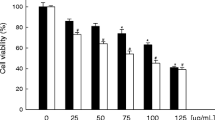Abstract
The apoptotic effects of indole-3-carbinol (I3C) were exhibited in many human cancer cells. However, the apoptotic effects of I3C on nasopharyngeal cancer cells were still unknown. In this study, we first examined the potential effects of I3C on the induction of apoptosis in human nasopharyngeal cancer cells CNE-2 and further characterized the mechanism(s) involved in the effects. Apoptotic cells after treatment with I3C were analyzed by flow cytometry. The change in relative mitochondrial transmembrane potential in the CNE-2 cells was analyzed with rhodamine 123 staining. The protein levels of MAPK family and Fas/FasL were examined by Western blot. Our results indicated that I3C could induce apoptosis of CNE-2 cells in a dose- and time-dependent manner accompanied with increased mitochondrial membrane potential. Treatment with I3C significantly suppressed XIAP, c-IAP1 and Survivin protein, while elevated the expression of Omi, Smac and Cyto-c. Fas/FasL and MAPK pathway were involved in the induction of apoptosis. Taken together, these results demonstrated that I3C may induce mitochondria-mediated apoptosis via the Fas death receptor in CNE-2 cells. This molecular mechanism for apoptotic effect of I3C on nasopharyngeal cancer cells suggested that I3C might become a preventive and therapeutic agent against nasopharyngeal cancer.





Similar content being viewed by others
References
Sarkar FH, Li Y, Wang Z, Kong D. Cellular signaling perturbation by natural products. Cell Signal. 2009;21(11):1541–7.
Chinni SR, Li Y, Upadhyay S, Koppolu PK, Sarkar FH. Indole-3-carbinol (I3C) induced cell growth inhibition, G1 cell cycle arrest and apoptosis in prostate cancer cells. Oncogene. 2001;20:2927–36.
Garcia HH, Brar GA, Nguyen DH, Bjeldanes LF, Firestone GL. Indole-3-carbinol (I3C) inhibits cyclin-dependent kinase-2 function in human breast cancer cells by regulating the size distribution, associated cyclin E forms, and subcellular localization of the CDK2 protein complex. J Biol Chem. 2005;280:8756–64.
Howells LM, Neal CP, Brown MC, Berry DP, Manson MM. Indole-3-carbinol enhances anti-proliferative, but not anti-invasive effects of oxaliplatin in colorectal cancer cell lines. Biochem Pharmacol. 2008;75:1774–82.
Sarkar FH, Li Y. Indole-3-carbinol and prostate cancer. J Nutr. 2004;134:3493S–8S.
Safe S, Papineni S, Chintharlapalli S. Cancer chemotherapy with indole-3-carbinol, bis(3′-indolyl)methane and synthetic analogs. Cancer Lett. 2008;269:326–38.
Brew CT, Aronchik I, Hsu JC, Sheen JH, Dickson RB, Bjeldanes LF, Firestone GL. Indole-3-carbinol activates the ATM signaling pathway independent of DNA damage to stabilize p53 and induce G1 arrest of human mammary epithelial cells. Int J Cancer. 2006;118:857–68.
Chung FL, Morse MA, Eklind KI, Xu Y. Inhibition of tobacco-specific nitrosamine-induced lung tumorigenesis by compounds derived from cruciferous vegetables and green tea. Ann N Y Acad Sci. 1993;686:186–201.
Kuang YF, Chen YH. Induction of apoptosis in a non-small cell human lung cancer cell line by isothiocyanates is associated with P53 and P21. Food Chem Toxicol. 2004;42:1711–8.
Souli E, Machluf M, Morgenstern A, Sabo E, Yannai S. Indole-3-carbinol (I3C) exhibits inhibitory and preventive effects on prostate tumors in mice. Food Chem Toxicol. 2008;46:863–70.
Weng JR, Tsai CH, Kulp SK, Chen CS. Indole-3-carbinol as a chemopreventive and anti-cancer agent. Cancer Lett. 2008;262:153–63.
Chou J, Lin YC, Kim J, You L, Xu Z, He B, Jablons DM. Nasopharyngeal carcinoma–review of the molecular mechanisms of tumorigenesis. Head Neck. 2008;30(7):946–63.
Zamzami N, Maisse C, Metivier D, Kroemer G. Measurement of membrane permeability and permeability transition of mitochondria. Method Cell Biol. 2001;65:147–58.
Li ZB, Wang JY, Jiang B, Zhang XL, An LJ, Bao YM. Benzobijuglone, a novel cytotoxic compound from Juglans mandshurica, induced apoptosis in HeLa cervical cancer cells. Phytomedicine. 2007;14:846–52.
Zamzami N, Marchetti P, Castedo M, Zanin C, Vayssiere JL, Petit PX, et al. Reduction of mitochondrial potential constitutes an early irreversible step of programmed lymphocyte death in vivo. J Exp Med. 1995;181:1661–72.
Von Ahsen, Waterhouse NJ, Kuwana T, Newmeyer DD, Green DR. The ‘harmless’ release of cytochrome c. Cell Death Differ. 2000;7:1192–9.
Chang L, Karin M. Mammalian MAP kinase signalling cascades. Nature. 2001;410:37–40.
Xia Z, Dickens M, Raingeaud J, Davis RJ, Greenberg ME. Opposing effects of ERK and JNK-p38 MAP kinases on apoptosis. Science. 1995;270:1326–31.
Dhanasekaran DN, Reddy EP. JNK signaling in apoptosis. Oncogene. 2008;27:6245–51.
Olson JM, Hallahan AR. p38 MAP kinase: a convergence point in cancer therapy. Trends Mol Med. 2004;10:125–9.
Shi W, Bastianutto C, Li A, Perez-Ordonez B, Ng R, Chow KY, Zhang W, Jurisica I, Lo KW, Bayley A, Kim J, O’Sullivan B, Siu L, Chen E, Liu FF. Multiple dysregulated pathways in nasopharyngeal carcinoma revealed by gene expression profiling. Int J Cancer. 2006;119:2467–75.
Zeng ZY, Zhou YH, Zhang WL, Xiong W, Fan SQ, Li XL, Luo XM, Wu MH, Yang YX, Huang C, Cao L, Tang K, Qian J, Shen SR, Li GY. Gene expression profiling of nasopharyngeal carcinoma reveals the abnormally regulated Wnt signaling pathway. Hum Pathol. 2007;38:120–33.
Kavurma MM, Khachigian LM. Signaling and transcriptional control of Fas ligand gene expression. Cell Death Differ. 2003;10:36–44.
Schneider P, Holler N, Bodmer JL, Hahne M, Frei K, Fonta A, Tschopp J. Conversion of membrane-bound Fas (CD95) ligand to is soluble form is associated with downregulation of its proapoptotic activity and loss of liver toxicity. J Exp Med. 1998;187:1205–13.
Conflict of interest statement
None.
Author information
Authors and Affiliations
Corresponding author
Rights and permissions
About this article
Cite this article
Xu, Y., Zhang, J. & Dong, WG. Indole-3-carbinol (I3C)-induced apoptosis in nasopharyngeal cancer cells through Fas/FasL and MAPK pathway. Med Oncol 28, 1343–1348 (2011). https://doi.org/10.1007/s12032-010-9619-8
Received:
Accepted:
Published:
Issue Date:
DOI: https://doi.org/10.1007/s12032-010-9619-8




